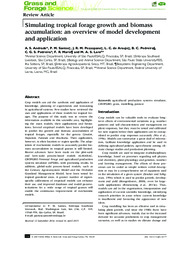Simulating tropical forage growth and biomass accumulation: an overview of model development and application.
Simulating tropical forage growth and biomass accumulation: an overview of model development and application.
Author(s): ANDRADE, A. S.; SANTOS, P. M.; PEZZOPANE, J. R. M.; ARAUJO, L. C. de; PEDREIRA, B. C. e; PEDREIRA, C. G. S.; MARIN, F. R.; LARA, M. A. S.
Summary: Crop models can aid the synthesis and application of knowledge, planning of experiments and forecasting in agricultural systems. Few studies have reviewed the uses and applications of these models for tropical forages. The purpose of this study was to review the information available in this scientific area, highlighting the main models, their applications and limitations. Several empirical models have been developed to predict the growth and biomass accumulation of tropical forages, especially for the genera Cynodon, Paspalum, Panicum and Brachiaria. Their application, however, is often location or region specific. The adaptation of mechanistic models to accurately predict biomass accumulation in tropical grasses is still limited. Recent advances have been made on the plot-scale and farm-scale process-based models ALMANAC, CROPGRO Perennial Forage and agricultural production systems simulator (APSIM), with promising results. In addition, global-scale process-based models, such as the Century Agroecosystem Model and the Orchidee Grassland Management Model, have been tested for tropical grassland areas. A greater number of regionspecific calibrations of empirical models can enhance their use, and improved databases and model parameterizations for a wide range of tropical grasses will enable the continuous improvement of mechanistic models.
Publication year: 2016
Types of publication: Journal article
Keywords: Agricultural production, CROPGRO, Grass, Modelling, Pasture, Systems simulator
Observation
Some of Embrapa's publications are published as ePub files. To read them, use or download one of the following free software options to your computer or mobile device. Android: Google Play Books; IOS: iBooks; Windows and Linux: Calibre.
Access other publications
Access the Agricultural Research Database (BDPA) to consult Embrapa's full library collection and records.
Visit Embrapa Bookstore to purchase books and other publications sold by Embrapa.

